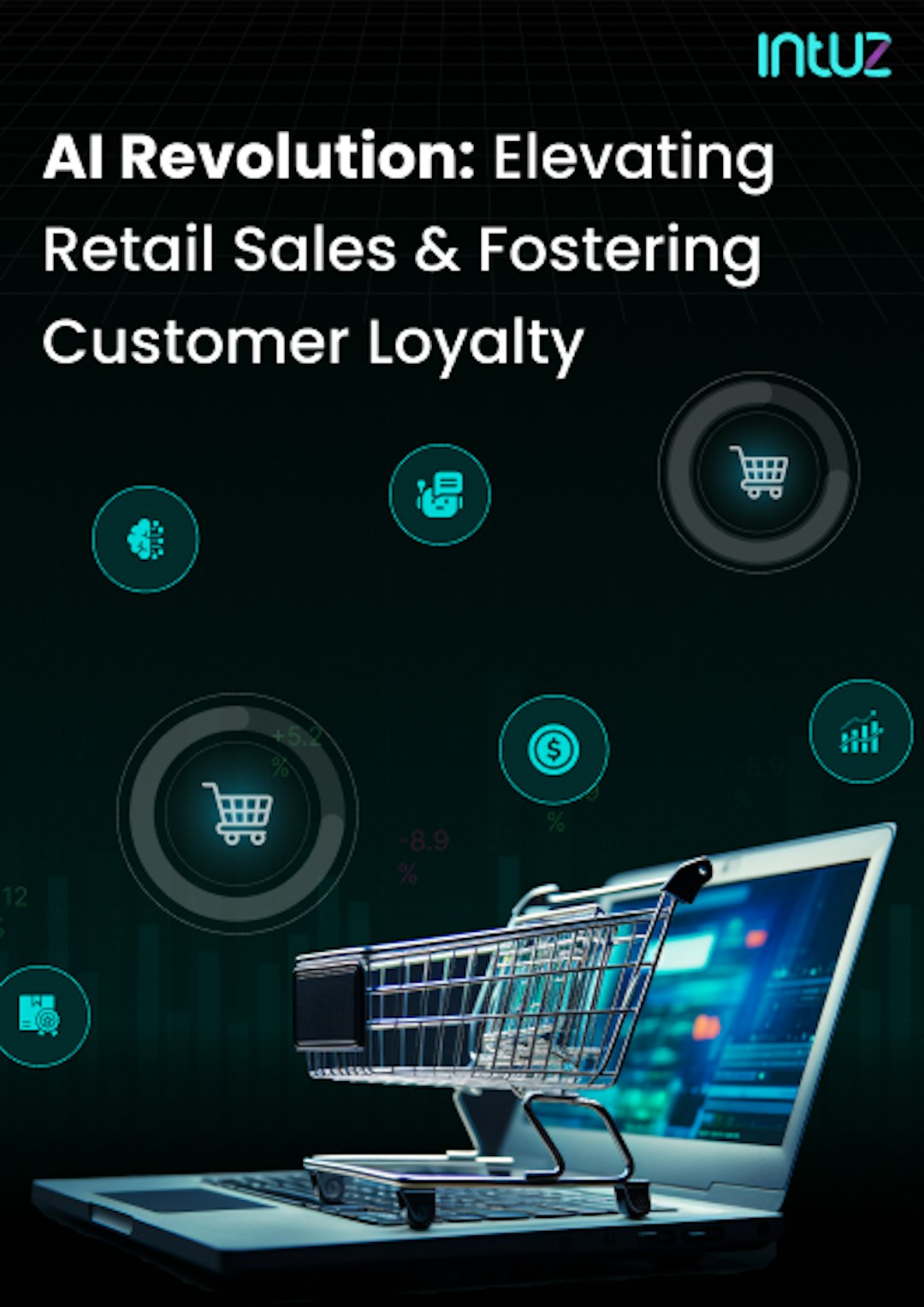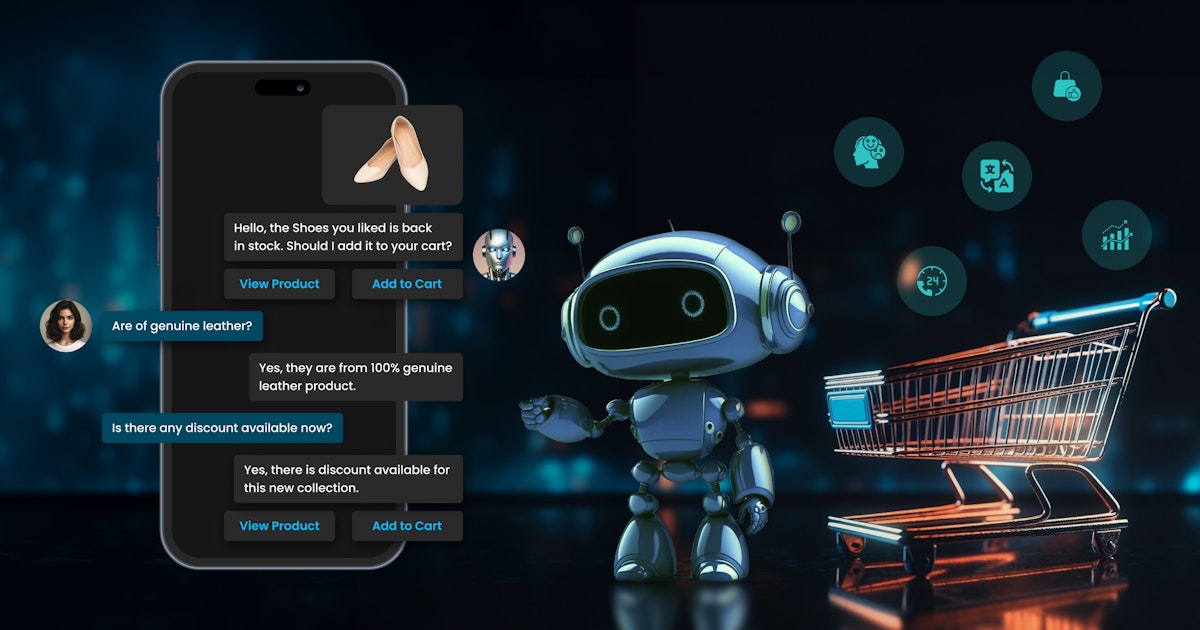Table of Content
Imagine waking up one fine morning to buy a new pair of sunglasses. You pick up your mobile phone, go to the app of your favorite eCommerce store, and start browsing through sunglasses. You finally stumble upon a pair that will look good.
You switch on your video, and the app’s software overlaps different sunglasses onto your face virtually, enabling you to try various styles and colors.
Welcome to the future of shopping, which is all at your fingertips thanks to Generative AI!
From creating fantastic, one-of-a-kind products to figuring out what you want to buy before you even know it, this advanced AI technology is turning the whole shopping game on its head.
Generative AI in eCommerce: Overview
There is no doubt that eCommerce has experienced exponential growth in the past decade. Online retail sales worldwide are estimated to reach USD 58.74 trillion by 2028.
Generative AI, of course, is now leading the charge in the eCommerce revolution. The global market for this technology is projected to be valued at USD 208.8 billion by 2032 - for a good reason.
From the seamless integration of virtual try-ons that defy geographical and physical constraints to developing visual merchandising layouts, eCommerce brands have been empowered to create relevant products by anticipating customer needs and personalizing shopping experiences.
They can use Generative AI to analyze customer data, such as purchase history, browsing behavior, device preference, and so on, which, in turn, helps in making product recommendations and rolling out targeted marketing campaigns.
Generative AI-powered virtual try-on in eCommerce: What it is and how it works?
Virtual try-on, often referred to as “virtual fitting” or “digital try-on,” involves the use of a mobile device video or webcam on the desktop and Augmented Reality (AR) to facilitate customers to virtually “try on” products.
From evaluating the fitting of a pair of jeans to assessing the shade of lipstick on their face, virtual try-ons enhance the convenience factor for online shoppers.
The technology involves using 3D viewers, software development kits (SDKs), and AR to create a more realistic and accurate representation of the product's appearance.
Did you know that 70% of returns on eCommerce orders are due to style, size, and fit issues? Since customers buy and receive what they request, this also reduces the likelihood of returning the products, which saves pick-up delivery costs for the eCommerce brand.
Generative AI virtual try-ons provide an immersive and accurate experience.
With so many benefits, it has found much success. Leading cosmetics brand M·A·C reported a 200% increase in customer engagement within the first month of implementing a virtual shade finder for lipsticks.
Brands offering virtual try-ons in eCommerce and retail include:
- Sephora has been utilizing this technology since 2016. The makeup company created the Sephora Virtual Artist mobile app, enabling customers to try hundreds of makeup products and simplifying the buying experience. This move resulted in a 13% increase in sales.
- The luxury watch brand Baume & Mercier incorporated the virtual try-on technology on its website, allowing visitors to virtually try the watches from their Riviera collection and see how they look on their wrists before making a purchase decision.
- The well-known Swedish furniture company introduced the IKEA Place mobile app in 2017. Customers use AR and virtually place furniture items in their homes through the device. It led to a 50% increase in online sales.
But are virtual try-ons the only win here? How is this technology being applied and expanding into different realms of eCommerce? Let us find out.
Use cases of Generative AI in eCommerce
1. Demand forecasting
A significant benefit of this AI technology is that it enables eCommerce businesses and retailers to predict demand and optimize inventory levels, avoiding excess or less stock, reducing wastage, and saving costs.
Generative AI analyzes market trends, past sales, customer preferences, and other factors, which helps them adjust inventory accordingly.
2. Timely fraud prevention
Generative AI models help create synthetic data resembling customer buying patterns, transactions, and past interactions.
This data can make it more challenging for fraudsters to differentiate between accurate and “fabricated” data, thus helping eCommerce businesses and retailers keep sensitive user data safe and secure.
Plus, this technology can be trained on historical transactional data about customer behaviors so it can flag activities that deviate from the learned pattern as potential fraud.
3. Sustainable product design
Generative AI can aid eCommerce businesses and retailers in analyzing the material properties and environmental impact of the product they think customers will like.
Since being an environmentally conscious brand is paramount in this day and age, such analysis can help brands look for more eco-friendly alternatives.
4. Improved user engagement on mobile
Generative AI optimizes eCommerce platforms for various mobile interfaces. Because everyone is on mobile and prefers the device’s convenience, it makes sense to have technology available right in your palm.
When customers can browse, try, and select a product they want on their smartphones, it makes checkouts smooth and conversions higher.
5. Customer service automation with chatbots
Generative AI enables eCommerce businesses and retailers to deliver custom and efficient customer service 24/7. You see, AI-powered chatbots can handle shopper inquiries, provide product information, and resolve issues promptly. For instance, they can help customers track their orders or answer FAQs about product ingredients, shipping charges, and new collections.
6. AI-generated, SEO-driven content creation
The AI technology makes use of Natural Language Processing (NLP) to comprehend human language and generate unique blog posts, social media copy, and email marketing copy that aligns with your eCommerce brand’s tone of voice and target audience.
Using Generate AI, eCommerce businesses and retailers can publish contextual and relevant content based on product search results.
They can also routinely update product pages with AI-generated high-quality images and product descriptions, boosting the marketing team’s efficiency.
Extended applications of Generative AI in e-commerce and retail
A 2022 Statista report states that 43% of consumers in the US complain about being marketed products they have already bought, whereas 28% are seeing products that are not age-appropriate.
AI-powered e-commerce models are helping retailers overcome these challenges through:
1. AI-driven personalization
According to McKinsey, 71% of customers expect personalization. Machine Learning (ML) algorithms identify patterns and trends by analyzing customer buying behavior and purchase data. Generative AI uses this data to create personalized campaigns and offers at scale. It maximizes the average order value.
2. Dynamic pricing optimization
As per GE, 80% of customers research online before purchasing. Dynamic pricing helps e-commerce businesses and retailers earn 5% more margins on their sales while remaining competitive because of Generative AI.
It analyzes various factors, such as market demand, buyer needs, competitor pricing, and inventory levels, in real time to recommend optimal product prices.
3. Enhanced cross-selling and upselling
Generative AI can identify customer preferences and recommend similar or complementary products, thus increasing the order value. Analyzing buying data, it predicts seasonal and perennial trends and makes personalized recommendations at the right time.
Capture A Larger Audience With Our eCommerce Development Services
Explore the ServicesThe future of e-commerce and retail with Generative AI is bright.
In just a few years, we can expect AI-powered virtual personal shopping assistants to recommend products and create customized customer offerings.
Personalized in-store shopping experiences to improve customer loyalty will become vital. Custom product packaging to make products more appealing to individual customers will just be the icing on the cake!
We anticipate a future where every shopping experience is just as unique as the buyer. Embracing the ongoing revolution of Generative AI is imperative if e-commerce businesses and retailers want to stand out in this competitive market.
Book a 45-minute free consultation with our AI experts. You will get a complimentary strategy or roadmap leveraging Generative AI into your eCommerce website/applications.
%402x-185ca.jpg?w=2400&q=80&auto=format,compress&fm=png8)





